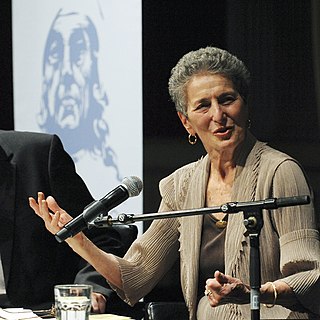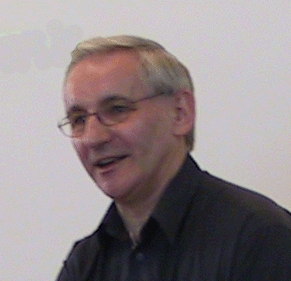Related Research Articles
The history of religion refers to the written record of human religious feelings, thoughts, and ideas. This period of religious history begins with the invention of writing about 5,200 years ago. The prehistory of religion involves the study of religious beliefs that existed prior to the advent of written records. One can also study comparative religious chronology through a timeline of religion, or the interrelationships and historical diversification of religious ideologies through the use of evolutionary philosophy and broad comparativism. Writing played a major role in standardizing religious texts regardless of time or location, and making easier the memorization of prayers and divine rules.
The world's principal religions and spiritual traditions may be classified into a small number of major groups, though this is not a uniform practice. This theory began in the 18th century with the goal of recognizing the relative levels of civility in different societies, but this practice has since fallen into disrepute in many contemporary cultures.

Religious studies, also known as the study of religion, is the scientific study of religion. There is no consensus on what qualifies as religion and its definition is highly contested. It describes, compares, interprets, and explains religion, emphasizing empirical, historically based, and cross-cultural perspectives.
Secularity, also the secular or secularness, is the state of being unrelated or neutral in regards to religion. Origins of secularity can be traced to the Bible itself and fleshed out through Christian history into the modern era. In the medieval period there were even secular clergy. Furthermore, secular and religious entities were not separated in the medieval period, but coexisted and interacted naturally. The word "secular" has a meaning very similar to profane as used in a religious context.

World religions is a category used in the study of religion to demarcate at least five—and in some cases more—religions that are deemed to have been especially large, internationally widespread, or influential in the development of Western society. Buddhism, Christianity, Hinduism, Islam, and Judaism are always included in the list. From a perspective of theological objectivity and totality, inclusion of other religions in the category, such as that of Sikhism, and to lesser degree, Shinto is too observed. These are often juxtaposed against other categories, such as folk religions, Indigenous religions, and new religious movements (NRMs), which are also used by scholars in this field of research. Less dividing is the concept of major religious groups.

Wendy Doniger O'Flaherty is an American Indologist whose professional career has spanned five decades. A scholar of Sanskrit and Indian textual traditions, her major works include The Hindus: An Alternative History; Asceticism and Eroticism in the Mythology of Siva; Hindu Myths: A Sourcebook; The Origins of Evil in Hindu Mythology; Women, Androgynes, and Other Mythical Beasts; and The Rig Veda: An Anthology, 108 Hymns Translated from the Sanskrit. She is the Mircea Eliade Distinguished Service Professor of History of Religions at the University of Chicago, and has taught there since 1978. She served as president of the Association for Asian Studies in 1998.

Natalie Zemon Davis, was an American-Canadian historian of the early modern period. She was the Henry Charles Lea Professor of History at Princeton University. Her work originally focused on France, but it later broadened to include other parts of Europe, North America, and the Caribbean. For example, her book, Trickster Travels (2006), views Italy, Spain, Morocco and other parts of North Africa and West Africa through the lens of Leo Africanus's pioneering geography. Davis' books have all been translated into other languages: twenty-two for The Return of Martin Guerre. She was the second female president of the American Historical Association.
David Jasper is a Professor Emeritus of Literature and Theology at the University of Glasgow.

Irving R. Hexham is an English-Canadian academic who has published twenty-three books and numerous articles, chapters, and book reviews. Currently, he is Professor of Religious Studies at the University of Calgary, Alberta, Canada, married to Karla Poewe who is Professor Emeritus of Anthropology at the University of Calgary, and the father of two children. He holds dual British and Canadian citizenship.

Marina von Neumann Whitman is an American economist, writer and former automobile executive. She is a professor of business administration and public policy at the University of Michigan's Ross School of Business as well as The Gerald R. Ford School of Public Policy.
Donald Sewell Lopez Jr. is the Arthur E. Link Distinguished university professor of Buddhist and Tibetan Studies at the University of Michigan, in the Department of Asian Languages and Cultures.
Caroline Walker Bynum, FBA is a Medieval scholar from the United States. She is a University Professor emerita at Columbia University and Professor emerita of Western Medieval History at the Institute for Advanced Study in Princeton, New Jersey. She was the first woman to be appointed University Professor at Columbia. She is former Dean of Columbia's School of General Studies, served as president of the American Historical Association in 1996, and President of the Medieval Academy of America in 1997–1998.
James A. Herrick was an American academic. He was the Guy Vanderjagt Professor of Communication and former communication chair at Hope College.

Richard Steigmann-Gall is an Associate Professor of History at Kent State University, and the former Director of the Jewish Studies Program from 2004 to 2010.

Enchanted Feminism: The Reclaiming Witches of San Francisco is an anthropological study of the Reclaiming Wiccan community of San Francisco. It was written by the Scandinavian theologian Jone Salomonsen of the California State University, Northridge and first published in 2002 by the Routledge.
Arthur Versluis is a professor and Department Chair of Religious Studies in the College of Arts & Letters at Michigan State University.
Religious communism is a form of communism that incorporates religious principles. Scholars have used the term to describe a variety of social or religious movements throughout history that have favored the common ownership of property. There are many historical and ideological similarities between Religious communism and Liberation Theology.

The definition of religion is a controversial and complicated subject in religious studies with scholars failing to agree on any one definition. Oxford Dictionaries defines religion as the belief in and/or worship of a superhuman controlling power, especially a personal God or gods. Others, such as Wilfred Cantwell Smith, have tried to correct a perceived Western bias in the definition and study of religion. Thinkers such as Daniel Dubuisson have doubted that the term religion has any meaning outside of Western cultures, while others, such as Ernst Feil doubt that it has any specific, universal meaning even there.
The Center for Jewish Studies Heidelberg is an accredited institution of higher learning, supported by the Central Council of Jews in Germany and funded by the German federal government. The HfJS operates in close cooperation with the University of Heidelberg and opens its doors to students and scholars, regardless of religious affiliation.
Mayfair Yang or Yang Meihui is a Taiwanese-American cultural anthropologist of China. Her research focuses on modernity, religion and secularism, state formation, religious environmentalism, China Studies, gender studies, postcolonial studies, and media studies.
References
Works cited
- Mozumder, Mohammad Golam Nabi (2011). Interrogating Post-Secularism: Jürgen Habermas, Charles Taylor, and Talal Asad (MA thesis). Pittsburgh, Pennsylvania: University of Pittsburgh. Retrieved 1 November 2018.